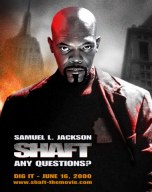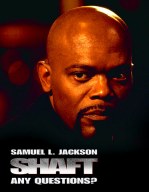| Shaft |
| |
 |
USA , 2000. Rated R. 99 minutes.
Cast: Samuel L. Jackson, Vanessa
Williams, Jeffrey Wright, Christian Bale, Toni Collette, Busta Rhymes,
Richard Roundtree, Dan Hedaya, Ruben Santiago-Hudson
Writers: John Singleton (story), Shane Salerno (screenplay &
story), Richard Price (screenplay & story)
Music: David Arnold
Cinematographer: Donald E.
Thorin
Producers: Scott Rudin
Director: John Singleton, Richard
Price
LINKS
|
 ho
is the man, who would risk his neck for his brother man? Shaft! Yes, the man
whose DNA makes him walk in the middle of oncoming traffic is back... and this
time he's got an Armani wardrobe and a much bigger paycheck. Back in the day
the movie posters screamed "Hotter than Bond–Cooler than Bullitt"; perhaps today's
tagline could be "Hotter than Bond–Cooler than... Bulworth"?
ho
is the man, who would risk his neck for his brother man? Shaft! Yes, the man
whose DNA makes him walk in the middle of oncoming traffic is back... and this
time he's got an Armani wardrobe and a much bigger paycheck. Back in the day
the movie posters screamed "Hotter than Bond–Cooler than Bullitt"; perhaps today's
tagline could be "Hotter than Bond–Cooler than... Bulworth"?
Isaac Hayes' original theme song played like the heartbeat of the original
1971 Shaft movie, and the transplant to this newer film's opening and
closing credits lends instant credibility and ambience by association. Director
John Singleton basically succeeds in paying homage to the Gordon Parks directed
original–a forgettable film that nevertheless spawned two sequels and a TV series,
bailed out struggling MGM Pictures, made a star of Richard Roundtree, and kickstarted
the whole Blaxploitation
genre. Those early 70's b-films, made mainly by white producers for black audiences,
were spoofed in the 1988 film I'm Gonna Get You Sucka, and had titles
like Cleopatra Jones and the Casino of Gold and The Mack. They
may seem negligible and dated to the CGI-soaked eyeballs of today's movie audiences,
but without them, it's doubtful films like Do The Right Thing, Menace
II Society or even Pulp
Fiction would ever have made it to the screen. Plus, those films have
the best soundtracks around. You dig?
Shaft begins with New York City Police Detective John Shaft (Samuel L. Jackson–Rules
of Engagement, The Negotiator)
arriving at the scene of a brutal attack on a young black man outside a ritzy
bar. With the help of a waitress (Toni Collette) who furtively identifies the
attacker as richboy Walter Wade, Jr. (Christian Bale–American
Psycho), Shaft soon has his man in custody. The victim dies; the terrified
waitress (and sole witness) vanishes, and Wade's moneyed status allows him to
jump bail and flee the country. Two years later, with the aid of his streetwise
cohort Rasaan (Busta Rhymes), Shaft hauls Wade back into custody as he sneaks
back into the country. In the meantime, our hero has been doing his best to
put the squeeze on Dominican druglord "Peoples" Hernandez (Jeffrey Wright) by
throwing him in jail on a bogus charge following an unsuccessful drug raid.
One unjust thing leads to another, and Wade is out on bail once more, free to
play "Get That Waitress!" (a variation on the old Hollywood theme of "Silence
That Witness!") with the help of his new Dominican acquaintance. It's enough to make a good cop quit the force in disgust and handle things his
own way. You can probably guess what comes next, even if you haven't seen the
trailers.
It's enough to make a good cop quit the force in disgust and handle things his
own way. You can probably guess what comes next, even if you haven't seen the
trailers.
The excellent dual villain performances of Bale and Wright make for a smarter-than-average
plot formula, since their respective characters each have their own personal
reasons for wanting Shaft out of commission. Jackson's turn as recalcitrant
cop John Shaft–a stunningly, self-assured screen presence–rounds out this tripartite
struggle. Jeffrey Wright (a Tony award winner for Angels in America)
crafts a character compelling enough in Peoples to match Shaft in swagger and
Wade, Jr. in cunning. At times he actually seems to slow the rest of the movie
down to match his own laconic pace. It's quite a thing to behold. His accent
is troublesome, however; it's often so thick it's a distraction. Nevertheless,
this is a small price to pay for a compelling villain these days, considering
the feeble competition for your multiplex dollar.
Early on, the film shifts focus from Shaft railing powerlessly
against a corrupt system that protects people like Wade to his more sure-footed
dealings with career criminals like Peoples. In the game of cops and robbers,
each side usually knows where to find the other. The Wade character doesn't
play by the usual rules, however, so partway through the movie you may get
the feeling that you've lost something, finally mumbling to yourself, "Hey,
wasn't there another bad guy in this film?" As Wade, Bale is vile and completely
unrepentant, leaping out from the screen like some evil, human exclamation
mark. But then he just disappears for awhile; eventually showing up for an
unconvincing onscreen reunion with Peoples that only reminds the audience
of his wasted potential as a truly memorable movie villain. There are other
obvious continuity gaps in the film, probably because this Shaft is
just not as grounded in reality as the original, but it can afford to coast
along on Jackson's charm. Singleton has done reality flicks (Rosewood,
Boyz in the Hood), and hasn't been particularly well rewarded financially,
so it's possible he's just flexing some new muscles here.
Roundtree returns in his original role of John Shaft, to play
uncle and mentor to the new John Shaft. Uncle John is a little older
and wiser, but he is no less cynical and no less attractive to the ladies,
judging by the two on his arms as he leaves the Lennox Lounge. Look closely
and you might also see Gordon Parks in that bar, seated at a table. This is
where the film really shows its spark–in the little touches. Hardly
anyone knows who Parks is, much less what he looks like. But by putting the
first black director of a studio feature in his picture, Singleton shows he
knows what he's doing and why.
The rest of the cast is exploited for maximum dramatic and/or comedic effect.
Rhymes is especially noteworthy. (How does Singleton get these performances
out of rappers?) However, Vanessa Williams needs much more screen time in order
to round out her supporting character. As his I've-got-your-back fellow cop,
she seems the closest thing to a constant female presence in Shaft's life (remember
the song "He's a complicated man, but no one understands him but his woman").
The motivations of some of the other characters are little difficult to fathom,
especially the dirty cops (Dan Hedaya and Ruben Santiago-Hudson). And this generation
of Shaft seems a little too teflon-coated. Hardly anyone lays a finger
on him throughout the whole movie, so I guess all that Jedi mind training over
at The Phantom Menace really paid off.
There is a lot of funny dialogue in Shaft, but you don't often get much
time to enjoy the humour before something else grabs your attention. When you
hear Shaft utter a line like, "It's Giuliani time!" you know you are in for
some serious people and property damage. Singleton and co-screenwriters Shane
Salerno and Richard Price (Clockers) have crafted something entertaining
and rare here–a fun movie with soul. Check out the scene of a man plummeting
from a tall building immediately following a brief scene featuring the two crooked
cops walking out of a building–one asks the other "How did the [stock]
market do today?" The whole thing lasts maybe 12 seconds. Subtle and
inspired!
AboutFilm.Com
The Big Picture
|
| Alison |
-
|
| Carlo |
C
|
| Dana |
-
|
| Glenn |
B+
|
| Jeff |
-
|
| Jen |
-
|
Despite, or perhaps even because of, the tension on set, the film's main strength
is Jackson himself. Jackson raised the ire of producer Scott Rudin (The Firm,
Sleepy Hollow) by refusing to use some
of Price's re-written dialogue, declaring it to be too white. Rudin responded
by deleting all but two of Shaft's sexual encounters (including the one in the
opening credits that isn't even Jackson). So there is almost no sex in the film
at all. The story doesn't really suffer because of it, but it is a noticeable
flaw. Another is the scene of Shaft's vicious pistol-whipping of a young, small-time
drug pusher. Despite trying for a macabre Tarantino-esque comic set-up, the
show-all approach is too dark for its own good. The punishment, meant to deter
him from ruining the life of a 12-year-old boy, is likely the only way the punk
will get the message. But the scene goes way beyond what is necessary to show
that "the ends justifies the means" ideology runs in the Shaft family.
Not so subtle.
Jackson is perfect for this part. There is an underlying playfulness to his
screen personality that forms part of his gruff exterior. What sets Jackson
apart from other African-American stars like Will Smith or Eddie Murphy is the
kind of humour his characters emanate (Jimmy in Hard Eight or Jules in
Pulp Fiction for instance). It's not cute or self-deprecating; his characters
are funny in a "laugh, or I'll break this bottle over your head" kind of way.
Even considering their depth as performers, it's doubtful that Denzel Washington
or a post-Matrix Laurence Fishburne
could have sustained the right blend of likeable badass and avenging angel of
Harlem that Jackson manages to achieve in the role.
As he accepted his golden popcorn bucket at the 2000 MTV Movie
Awards, George Lucas–the King of Popcorn–predicted Jackson would
return to claim next year's prize for his work in Shaft (or did he mean the
next Star Wars movie?) Either way, this is what a Hollywood summer
blockbuster should be; smart, witty, franchise fodder that still manages to
deal with issues of race, corruption of justice and human foibles without
becoming heavy-handed.
By the way, the B+ rating stands for Bad Mothaf... Shut ya mouth! Any questions?
Review
© June 2000 by AboutFilm.Com and the author.
Images © 1996 - 2000 by Paramount Pictures
Corporation. All Rights Reserved.

 It's enough to make a good cop quit the force in disgust and handle things his
own way. You can probably guess what comes next, even if you haven't seen the
trailers.
It's enough to make a good cop quit the force in disgust and handle things his
own way. You can probably guess what comes next, even if you haven't seen the
trailers.
